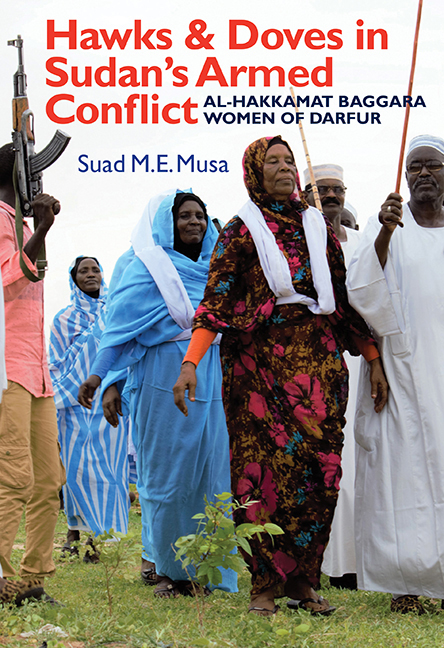Book contents
- Frontmatter
- Dedication
- Contents
- List of Illustrations
- Acknowledgements
- Glossary
- Abbreviations
- Note on Transliteration
- Introduction: Conflict in Darfur and the Role of Rural Darfuri Women
- 1 Ethnicity and Administration in Darfur
- 2 Conflict in Darfur: Causes and Implications
- 3 Al-Hakkamat Women
- 4 Local Inter-ethnic Conflicts
- 5 Government and Racial Assimilation of Ethnic Groups
- 6 Liaising with Government
- 7 New Duties and Obligations
- 8 Roles in Peace and Reconciliation
- 9 Urban Identity and Social Change
- 10 Conclusion
- Appendix: Darfur Chronology, 1445–2017
- Bibliography
- Index
- Eastern African Studies
6 - Liaising with Government
Published online by Cambridge University Press: 12 October 2019
- Frontmatter
- Dedication
- Contents
- List of Illustrations
- Acknowledgements
- Glossary
- Abbreviations
- Note on Transliteration
- Introduction: Conflict in Darfur and the Role of Rural Darfuri Women
- 1 Ethnicity and Administration in Darfur
- 2 Conflict in Darfur: Causes and Implications
- 3 Al-Hakkamat Women
- 4 Local Inter-ethnic Conflicts
- 5 Government and Racial Assimilation of Ethnic Groups
- 6 Liaising with Government
- 7 New Duties and Obligations
- 8 Roles in Peace and Reconciliation
- 9 Urban Identity and Social Change
- 10 Conclusion
- Appendix: Darfur Chronology, 1445–2017
- Bibliography
- Index
- Eastern African Studies
Summary
We understand that the governments’ attention was initially drawn to al-Hakkamat by their performance in the arms confiscation campaign in the early 1990s. Their subsequent contribution to the mobilisation of combatants during the Bolad campaign in 1991/2 has further proved their potential as one of the most effective conventional rural and tribal institutions that could further the neopatrimonial approach of the riverine ruling and governing elites to domestic politics. This has coincided with the elites’ approach of interpreting all wars in Sudan as primarily racial and religious conflicts. By virtue of their ethnic foundation and political identity, al-Hakkamat have been brought to the fore of the politics of war and ethnic polarisation, which has now become the mainstay and the mainstream politics in Darfur and across Sudan.
The government deployed several measures for co-opting al-Hakkamat and manipulating their power and influence. These measures were meant equally to solicit the Baggara's sympathy for the government in wars that they interpreted on racial and religious terms, and to ensure endorsement of their political approach. They included exposure to the media, assembly and organisation, remodelling the conventional framework of al-Hakkamat, Islamic reorientation and military training, as discussed below.
AL-HAKKAMAT AND THE MEDIA
TV and radio are the state's media outlets and therefore represent the voice of the government and their means to manipulate information and to influence opinion. For rural people, radio constitutes the most available and accessible information device, and it is therefore used intensively by the governing elites to address the rural population. Nyala radio and TV stations were used to broadcast extensively specific programmes that featured and glorified al-Hakkamat and publicised their songs and performances.
These programmes included, for example, jalsat inbisatah (‘a sitting for entertainment/cheerfulness’), Murhakt al-gol (‘a grinder of speech’) and al-mughrāfah (the ladle/scoop, i.e. the scoop of wise and nice utterance).
Through these programmes, al-Hakkamat demonstrated beyond doubt that they are the right people to communicate effectively with people in rural areas, the Baggara audience in particular. They appeared to be speaking in tune with the government's politics, i.e. if the government call was Jihad, they would call for Jihad, and similarly if the government called for peace.
- Type
- Chapter
- Information
- Hawks and Doves in Sudan's Armed ConflictAl-Hakkamat Baggara Women of Darfur, pp. 115 - 130Publisher: Boydell & BrewerPrint publication year: 2018



